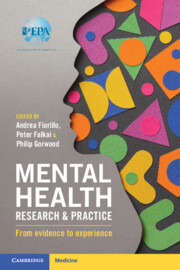Book contents
- Mental Health Research and Practice
- Mental Health Research and Practice
- Copyright page
- Contents
- Contributors
- Preface
- Chapter 1 Chemical and Behavioral Addictions
- Chapter 2 Nonsuicidal Self-Injury in Adolescents
- Chapter 3 Consultation-Liaison Psychiatry and Psychosomatics
- Chapter 4 Recent Developments in Cultural Psychiatry
- Chapter 5 New Perspectives in Eating Disorders
- Chapter 6 Emergency Psychiatry
- Chapter 7 How Can Forensic Psychiatry Contribute to Legal and Ethical Controversies in Society?
- Chapter 8 Diagnosis of Co-occurrent Mental Health Problems in Persons with Intellectual Disability, Major Communication and Insight Difficulties, and Stressor-Related Disorders
- Chapter 9 Attention Deficit Hyperactivity Disorder in Adults
- Chapter 10 Translational Neuroimaging in Psychiatry
- Chapter 11 Challenges in the Therapy of Psychiatric Disorders in the Elderly
- Chapter 12 Position-Taking
- Chapter 13 Physical Health of Patients with Schizophrenia
- Chapter 14 Evolving Concepts for the Assessment and Treatment of Schizophrenia
- Chapter 15 The Role of Rapid-Acting Antidepressants in Suicidal Crisis Management
- Chapter 16 Telemental Health Care
- Chapter 17 Development and Current Status of ICD-11 Mental, Behavioral, or Neurodevelopmental Disorders
- Chapter 18 Anxiety Disorders
- Chapter 19 Did We Lose Interest and Pleasure in the Concept of Major Depression?
- Chapter 20 Personality Disorders
- Index
- References
Chapter 9 - Attention Deficit Hyperactivity Disorder in Adults
From Research to Clinical Practice
Published online by Cambridge University Press: 01 February 2024
- Mental Health Research and Practice
- Mental Health Research and Practice
- Copyright page
- Contents
- Contributors
- Preface
- Chapter 1 Chemical and Behavioral Addictions
- Chapter 2 Nonsuicidal Self-Injury in Adolescents
- Chapter 3 Consultation-Liaison Psychiatry and Psychosomatics
- Chapter 4 Recent Developments in Cultural Psychiatry
- Chapter 5 New Perspectives in Eating Disorders
- Chapter 6 Emergency Psychiatry
- Chapter 7 How Can Forensic Psychiatry Contribute to Legal and Ethical Controversies in Society?
- Chapter 8 Diagnosis of Co-occurrent Mental Health Problems in Persons with Intellectual Disability, Major Communication and Insight Difficulties, and Stressor-Related Disorders
- Chapter 9 Attention Deficit Hyperactivity Disorder in Adults
- Chapter 10 Translational Neuroimaging in Psychiatry
- Chapter 11 Challenges in the Therapy of Psychiatric Disorders in the Elderly
- Chapter 12 Position-Taking
- Chapter 13 Physical Health of Patients with Schizophrenia
- Chapter 14 Evolving Concepts for the Assessment and Treatment of Schizophrenia
- Chapter 15 The Role of Rapid-Acting Antidepressants in Suicidal Crisis Management
- Chapter 16 Telemental Health Care
- Chapter 17 Development and Current Status of ICD-11 Mental, Behavioral, or Neurodevelopmental Disorders
- Chapter 18 Anxiety Disorders
- Chapter 19 Did We Lose Interest and Pleasure in the Concept of Major Depression?
- Chapter 20 Personality Disorders
- Index
- References
Summary
Attention deficit hyperactivity disorder (ADHD) is a common neurodevelopmental disorder that persists into adulthood. We provide an overview of prevalence, diagnosis, and treatment. Future directions highlight key areas of progress. ADHD is not always an early childhood onset disorder; it may emerge as an impairing condition during the adolescent years. Transition from child to adult services is poor and greater efforts are needed to ensure effective treatment during this critical stage. There are sex differences in the expression of ADHD. Related to this, the diagnosis of ADHD is often missed in girls but is increasingly recognized in adult life. The impact of emotional instability as a core feature of ADHD on mental health is widely recognized. It is still the case that ADHD is often misdiagnosed for other common mental health conditions, and greater awareness of ADHD is needed among health care professionals. Prominent comorbidities include substance use and sleep problems. Finally, we consider the cognitive and neural processes that explain persistence of ADHD. The balance of default mode to task positive network activity may lead to core symptoms such as spontaneous mind wandering, and the role of saliency on task performance.
Keywords
- Type
- Chapter
- Information
- Mental Health Research and PracticeFrom Evidence to Experience, pp. 135 - 157Publisher: Cambridge University PressPrint publication year: 2024

